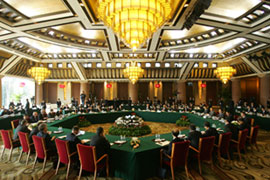US denies ‘deal’ with N Korea
Envoy rejects report of deal as six-nation nuclear talks resume in Beijing.

 |
| Several rounds of six-party talks have yet to produce significant progress [AFP] |
Envoys from Japan, Russia, China, the US and the two Koreas began their first round of talks on Thursday
| Nuclear negotiations |
|
2003 2004 June: Third round of talks discusses scope, time, and method of verification for disarming North Korea. Again no agreement is made 2005 North Korea subsequently demands a civilian light-water reactor; a demand rejected by the US and Japan 2006 December: Fifth round of talks end in deadlock. North Korea insists US financial sanctions end as a precondition to disarmament talks |
A report in Japan’s Asahi Shimbun newspaper on Thursday said the US and North Korean envoys had signed a memorandum at talks in January agreeing that the North’s first steps towards denuclearisation should be tied to the start of US deliveries of energy aid.
 |
| North Korea’s envoy says there are many issues of confrontation to overcome [AFP] |
Although the US led calls for United Nations sanctions in the wake of North Korea’s first nuclear weapon test last October, it has since engaged in a series of diplomatic moves to persuade the North to disarm.
“Joint efforts, wisdom and flexibility from all six countries are badly needed now more than any other time,” he said.